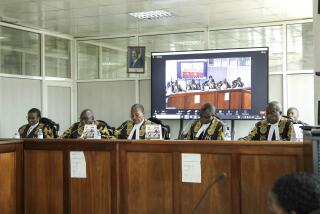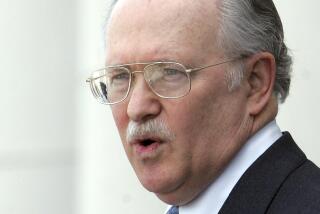Justice Antonin Scalia defends writings on anti-gay laws

WASHINGTON — Confronted by a gay student at Princeton University, Justice Antonin Scalia defended his writings comparing laws against homosexuality to those prohibiting bestiality and murder, saying he was arguing that many laws are based on society’s moral feelings.
“If we cannot have moral feelings against homosexuality, can we have it against murder?” Scalia asked in response to a question. “Can we have it against other things? I don’t apologize for the things I raise.”
Scalia said he was not equating homosexual conduct with bestiality or murder. “It’s a form of argument that I thought you would have known, which is called the ‘reduction to the absurd,’” he continued.
The exchange took place Monday evening, just three days after the Supreme Court agreed to rule on the constitutionality of laws against gay marriage, including California’s Proposition 8. Scalia was at Princeton to lecture on the Constitution and promote his new book, “Reading Law: The Interpretation of Legal Texts.”
PHOTOS: The best shots from the 2012 campaign
According to several news accounts, Duncan Hosie, a student who identified himself as gay, said he found it extraordinarily offensive that Scalia had linked homosexual conduct to bestiality and murder when he dissented in previous gay rights cases.
“I don’t think it’s necessary [to the argument], but it think it’s effective,” Scalia responded. “I’m surprised you aren’t persuaded.”
In 1996, Scalia dissented when the court struck down an anti-gay initiative from Colorado. There, he made a reference to murder: “The court’s opinion contains grim, disapproving hints that Coloradans have been guilty of ‘animus’ or ‘animosity’ toward homosexuality, as though that has been established as un-American. Of course it is our moral heritage that one should not hate any human being or class of human beings. But I had thought that one could consider certain conduct reprehensible — murder, for example, or polygamy, or cruelty to animals — and could exhibit even ‘animus’ toward such conduct. Surely that is the only sort of ‘animus’ at issue here: moral disapproval of homosexual conduct.”
Scalia dissented again in 2003 when the court struck down a Texas law that made sex between gays a crime. The opinion by Justice Anthony M. Kennedy overturned a 1986 ruling in Bowers vs. Hardwick that had upheld state sodomy laws.
“The Texas statute undeniably seeks to further the belief of its citizens that certain forms of sexual behavior are ‘immoral and unacceptable,’ … the same interest furthered by criminal laws against fornication, bigamy, adultery, adult incest, bestiality, and obscenity,” Scalia wrote in dissent. “Bowers held that this was a legitimate state interest. The court today reaches the opposite conclusion.... This effectively decrees the end of all morals legislation.”
In that same dissent, Scalia also questioned whether the laws against same-sex marriage could survive if “moral disapproval” is not a sufficient basis for upholding them, in effect predicting the cases the court agreed to hear Friday.
“Today’s opinion dismantles the structure of constitutional law that has permitted a distinction to be made between heterosexual and homosexual unions, insofar as formal recognition in marriage is concerned. If moral disapprobation of homosexual conduct is ‘no legitimate state interest’ for purposes of proscribing that conduct … what justification could there possibly be for denying the benefits of marriage to homosexual couples exercising ‘[t]he liberty protected by the Constitution?’”
The majority said then the decision striking down the Texas sodomy law was not about gay marriage, but Scalia was not persuaded. “This case ‘does not involve’ the issue of homosexual marriage only if one entertains the belief that principle and logic have nothing to do with the decisions of this court,” he wrote.
More to Read
Start your day right
Sign up for Essential California for news, features and recommendations from the L.A. Times and beyond in your inbox six days a week.
You may occasionally receive promotional content from the Los Angeles Times.







